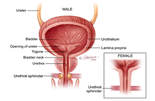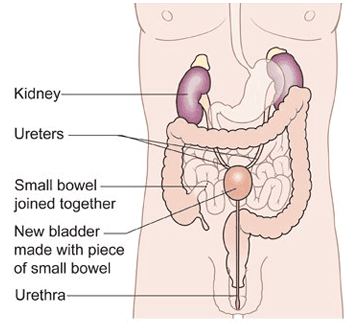Highly Advanced Treatment for Bladder Cancer at SafeMedTrip Affiliated World Class Hospitals in India.
Excellent Outcomes and Affordable Cost is assured.
Bladder Cancer Treatment in India
Why you should choose World Class Hospitals in India for Most Advanced Treatment for Bladder Cancer?





A urinary bladder is a hollow reservoir where urine is collected before it is expelled out through the urethra. The innermost layer of the bladder is called the endothelium or the urothelium. After that, is a layer of loose connective tissue called as lamina propria. The smooth muscle of the bladder lies outside the lamina propria. The bladder muscle is surrounded by a layer of fat.
Most of the times the cancer is limited to the urothelium and very rarely it invades the lamina propria and the muscular layer. A person with bladder cancer may complain of blood in urine, pain during urination and increased frequency of urination. A CT scan of the bladder and urine analysis can help to diagnose and confirm the condition.
Treatment of the bladder cancer depends on the stage of cancer. If it is diagnosed recently and is superficial, then chemotherapy, radiotherapy, laser or tumor resection techniques are used.
In case the bladder cancer is large, invasive or at multiple places in the bladder wall, then partial or complete cystectomy may be the only option available. This can be combined with postoperative radiotherapy and chemotherapy to restrict the spread of cancer to surrounding organs or limit its recurrence.
Treatment of Bladder Cancer at World Class Hospitals in India
• Bladder Sparing Surgery : This involves using a combination of chemotherapy and radiotherapy to destroy the cancer cells locally and also if they have spread to other parts of the body. Transurethral resection of bladder tumour and partial removal of bladder are also types of bladder sparing surgeries which are used when the tumor is superficial or minimally invasive. These treatment techniques can be used in combination with each other.
- Drug Therapy and Radiation Therapy Prior to Surgery : Can shrink the tumour and possibly completely eliminate the cancer. This technique is still in the experimental stage and can hope to offer patients an effective alternative to removing the bladder and an improved quality of life. Radiation therapy involves the use of focused high energy x-rays to destroy cancer cells. The x-rays are delivered from a machine that is outside of the patient. The damaging effect of radiation is cumulative, and a certain dose is required to stop the growth of cancer cells. In order to accomplish this, small radiation doses are administered for a few seconds each day (similar to having an x-ray), five days per week, for several weeks. Treatment is not painful.A chemotherapy drug, such as cisplatin, is usually given once every three weeks into a vein during radiation therapy. Cisplatin makes the tumor cells more sensitive to the radiation treatment, improving the chance of eliminating the cancer. The combination of chemotherapy and radiation therapy is associated with improved cancer control in the bladder and pelvic region compared to radiation therapy alone.
- Intravesical Chemotherapy and Immunotherapy : Following removal of tumour by TURBT, intravesical chemotherapy or intravesical immunotherapy may be used to try to prevent tumour recurrences. Intravesical means “within the bladder”. These therapeutic agents are put directly into the bladder through a catheter in the urethra (the catheter only stays in for a few minutes), are retained for one to two hours and are then urinated out.
- Transurethral Resection of Bladder Tumor : This surgery is performed under general or spinal anesthesia. It is a minimally invasive surgery. A thin slender fiber optic tube with a camera at one end called the cystoscope is inserted through the urethra into the bladder. The camera sends images of the size and location of cancer tissue within the bladder. Once the tumor location is confirmed, a thin wire loop is inserted through the cystoscope into the bladder. The loop scrapes of the tumor cells present in the urothelium. This tissue can then be sent for biopsy to grade the tumor.
- Laser Removal : If the tumor cells have invaded into the next layer, but are still localized to the bladder, the high frequency energy can be emitted to the area using a laser probe. The laser probe is inserted through the cystoscope and directed towards the cancerous are in the bladder. High energy radiation destroys the tumor cells completely in that area.
- Partial Cystectomy : This involves partial removal of the bladder wall and is performed when the tumor has invaded the bladder muscle. The affected portion of the wall is cut and removed and the remaining portion of the bladder is stitched up. This surgery reduces the bladder capacity as well as it contractile efficacy. Get Estimate
• Neobladder or Urine Diversion Techniques : This is required after radical cystectomy or complete removal of bladder in cases where the tumor has penetrated the bladder wall and spread beyond it
- Ilieal Conduit : A short piece of the intestine from the end of the small intestine or the colon is removed and connected to the ureters. This creates a passageway, known as an ileal conduit, for urine to pass from the kidneys to the outside of the body. Urine flows from the kidneys through the ureters into the ileal conduit. The conduit is connected to the skin on the front of the abdomen by an opening called a stoma (also known as a urostomy). After this procedure, a small bag is placed over the stoma to collect the urine, which comes out continuously in small amounts. The bag then needs to be emptied once it is full.
- Continent Diversion : A valve is created in a pouch made from the piece of intestine. The valve allows urine to be stored in the pouch. The pouch is connected to the ureters. It is emptied several times each day by placing a drainage tube (catheter) into the stoma through the valve. Some patients prefer this method because there is no bag on the outside and they can control the emptying of the bag.
- Neobladder or Reconstructive Surgery : A urinary reservoir resembling the bladder is made from a piece of small intestine or colon. The ureters are connected to the neobladder and the neobladder is sewn to the urethra. This allows the patient to urinate normally.Get Estimate
• Radical Cystectomy : 
• Laparoscopic Radical Cystectomy : In some cases, the surgeon may operate through several smaller incisions using special long, thin instruments, one of which has a tiny video camera on the end to see inside the pelvis. This is known as laparoscopic, or “keyhole” surgery. The surgeon may either hold the instruments directly or may sit at a control panel in the operating room and maneuver robotic arms to do the surgery. If it can be done, laparoscopic surgery may result in less pain and quicker recovery after the operation (due to the smaller incisions). But it has not been around as long as the standard type of surgery and it’s not yet clear if it is equally as effective. This technique is still in its infancy and is not practiced very commonly.
We Assure Most Affordable Estimates with in 48 Hours from Top Hospitals in India.
How it Works – Get Most Affordable Treatment in India
 |
Send medical reports by WhatsApp/Email |
 |
Receive quotation(s) within 48 Hours |
 |
Get Free Medical Visa & Airport Pick up |
 |
Medical Treatment Assisted & Fly Back Home |
Frequently Asked Questions
Once you have decided that you want to get treatment in India you can email us your latest medical reports and accompanying X-Rays, MRI Scans and other relevant medical documents at help@safemedtrip.com or Call or WhatsApp us on +91-9899993637 for one to one discussion with our executives.
Once we receive your reports, we will get them reviewed by our medical experts and will send you a detailed treatment package consisting of doctor’s diagnosis, treatment plan, cost of treatment, duration of stay in hospital and duration of stay in India besides other relevant details.
Once you have confirmed to us that you want to proceed further to get treatment in India, our team will help you with the Indian medical visa assistance and documentation process. We will also help you in arranging for a comfortable local stay for you and your attendant. You don’t have to send any money in advance.
Savings can be from 30-50%, depending upon the procedure and the destination. Your treatment will be carried out from only the best hospitals in India that are NABH accredited and have specialists that are recognized globally for their expertise.
From the date you decide on one of the three affordable treatment packages offered to you. It may take 1- 3 weeks to obtain Medical Visa and book flight tickets. We have zero waiting period and you can be received at the Airport on arrival and immediately admitted at hospital and treatment will start.
Its advisable that you should not delay your treatment particularly in case of severe illnesses like Cancer, Heart or Spine etc. Early start of treatment results in quick recovery and lower expense compared to delay of treatment.
The difference in cost package due to the labour and insurance costs of the hospital operating in India, and not by the difference in the quality of treatment.
Each patient is assigned to a SafeMedTrip Patient Case Manager who will take care of every single detail ranging from arrival to send off.
Yes, of course. We will provide you with complete assistance in selecting high-quality hotels near the hospital location that fits your budget.
You will be given a complete profile of the specialist before you proceed for the treatment. On special request, we will be happy to connect you with him through a teleconferencing service facilitated by Skype.
What people say about us

I had so many apprehensions and concerns prior to coming to India for surgery that I needed badly to regain my health. “Thanks for your always prompt responses to my volley of questions and concerns. I could not have managed even a step without your staff’s excellent care.
I couldn’t be happier with the Indian hospitals, surgeon, physicians and their expertise. Everyone is very professional yet compassionate. All staff nurses and doctors are very attentive. My stay during treatment in India was very comfortable.
Thanks you all and God bless you
Ms. Janet Biuware From Cameroon.Refer a Patient
Get the SafeMedTrip Advantage


No Obligation – Zero Cost Assistance. We do not collect any service fee from patients. You will directly pay the hospitals after you arrive in India. We ensure Quick, Hassle Free, Affordable Treatment at World Class hospitals in India.

 Click to WhatsApp
Click to WhatsApp +91-9899993637
+91-9899993637










